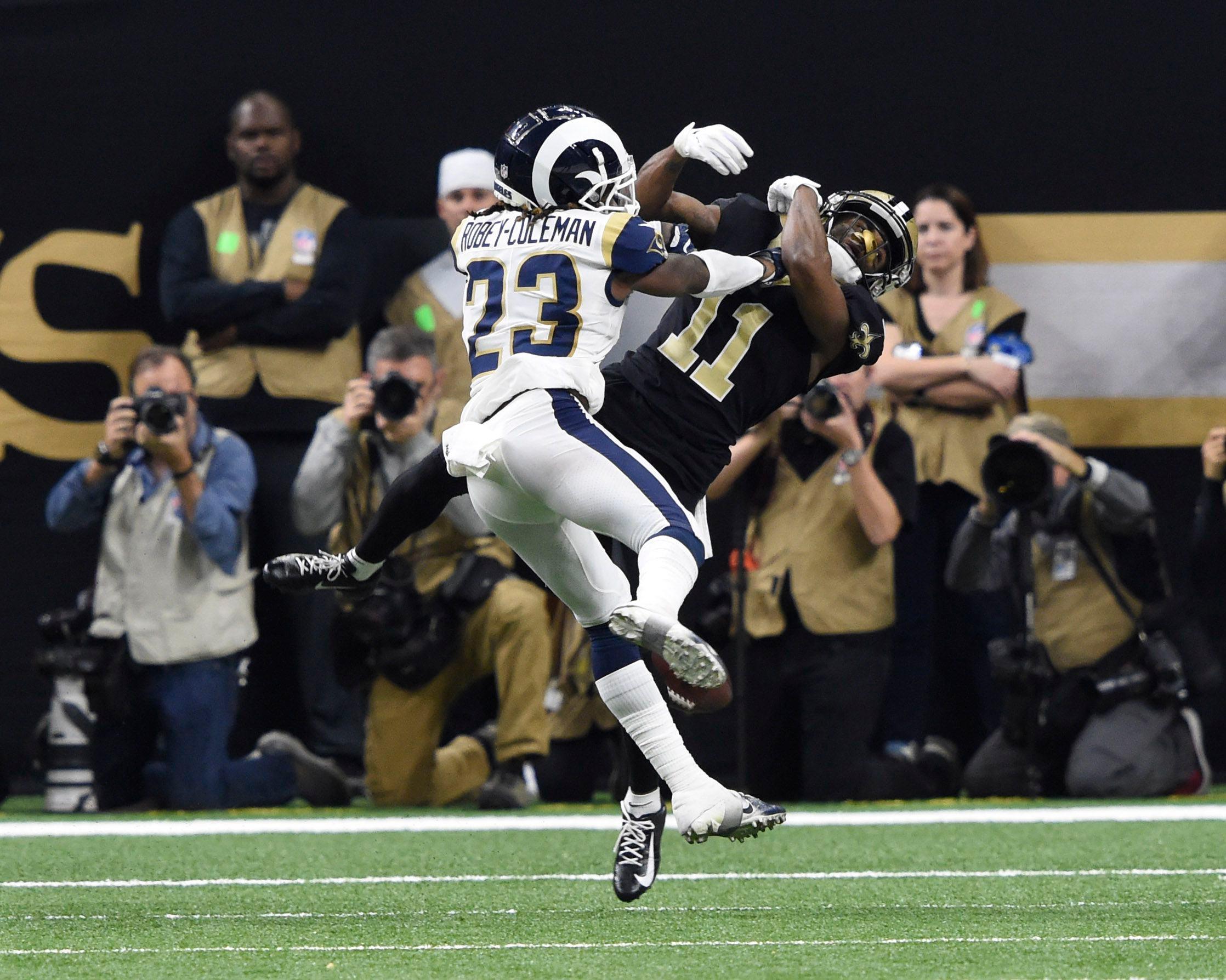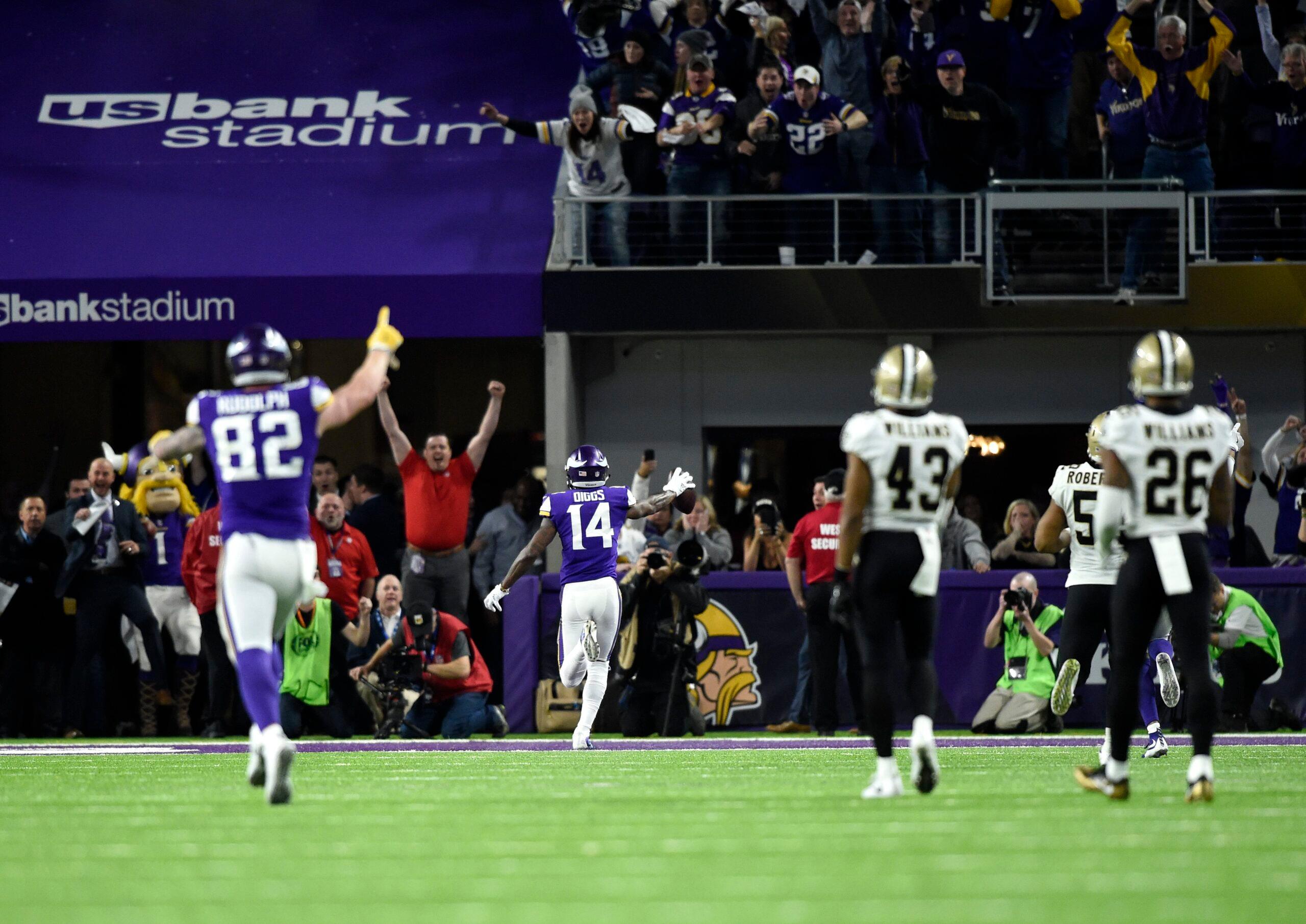The silence was the eeriest part. In a city constantly buzzing with sounds—the notes of a brass horn, the beat of a bounce song, the honk of a steamer on the Mississippi, the pour of a beer into a plastic to-go cup—a moment of quiet in New Orleans can feel unusual. This felt especially unusual given that for 48 hours leading up to Sunday’s NFC championship game, the volume had been ramped up considerably. The city was awash with people cheering at random moments and shouting in glee at neighbors, strangers, and friends alike. “Choppa Style” blared from seemingly every nearby radio and was featured in a video posted by the mayor declaring January 18 “Black and Gold Friday.” The citywide din peaked on Sunday afternoon, as for almost four hours the Superdome crowd did its best to blow out the Los Angeles Rams’ ear drums. In bars and living rooms around Orleans Parish, patrons in gold glitter and Alvin Kamara jerseys and fleur de lis earrings screamed as if Saints head coach Sean Payton had personally implored them to. And he had.
Then, at 5:23 p.m. local time, the noise stopped. The crowd, which had clamored to protest Rams kicker Greg Zuerlein’s 57-yard field goal attempt in overtime, paused. There would be shouts and boos and expletives later. But for now, there was a moment of still, one that was all too familiar to New Orleans fans who had watched Stefon Diggs haul up the Minnesota sideline a year before, and that was all too unsettling in a city that seems to be perpetually making noise about something.
Two playoff appearances, and two dead-silent, last-minute losses in as many years. Vikings 29, Saints 24 was only 371 days old when Rams 26, Saints 23 brought a fresher, deeper kind of football pain. Few NFL teams have endured multiple last-play devastations in such a short span, and perhaps even fewer have an identity so inextricably linked to their city. “It was as if the air was going out of your body, out of the dome,” says Mel Mitchell, a former Saints safety who was at this weekend’s game. “It was disappointing, and the disappointment started when that pass-interference wasn’t called. But this was like someone had stabbed you in the back.”
At Tracey’s, a sports bar on the edge of the Garden District where intricately decorated second line umbrellas hang from the ceiling and a giant “Brees” banner blankets a wall, the volume temporarily could have matched the booming decibel level inside the Superdome, according to patron Drew Greaves. Until that kick hit the net. “It went from a ears-bleeding volume,” Greaves says. “To … you can have a quiet conversation.”
I spoke to fans who told me they cried when they woke up the morning of the game, and to fans who popped out of bed at 7 a.m. because they were far too excited to sleep. The feeling was everywhere: This time would be different. Yet those were the same fans who, after the call that wasn’t and the kick that was, described Frenchmen Street as a scene of “collective mourning.” One man at Tracey’s attempted, somberly, in an accent tinged with both Cajun influence and brown liquor, to explain what this team means to the people here. He settled on something in between “they are a part of us” and “they mean everything,” and then picked up his drink.
“It’s strange,” he said. “It’s hard to describe, and I can’t put it into words. I cried today, and it was so many things. We deserved this.”

All day, Greaves had watched the people around him answer their phones with a confident “Who dat?” as if that response had fully replaced “Hello” as an appropriate greeting. At the edge of the French Quarter, hours after the final whistle, two tourists from San Francisco debated the meaning of the phrase. “There’s no answer to ‘Who dat,’” one said. “I don’t get it, but I’m fully into it. I don’t think there’s an answer, and there doesn’t have to be.”
There doesn’t have to be. Greaves’s girlfriend, Roxanne Legere, a native of the city, wore a Jeremy Shockey jersey to cheer the team on Sunday at Tracey’s. She remembers that after the Saints’ 31-17 win over the Colts in Super Bowl XLIV, one could walk down the street screaming “Who dat” to anyone and get a proper response. “It didn’t matter what you’re wearing, who you are,” she says. “You know they were going to say it back.”
It was disappointing, and the disappointment started when that pass-interference wasn’t called. But this was like someone had stabbed you in the back.Former Saints safety Mel Mitchell
New Orleans is a city defined by its dichotomy. Turkey and the Wolf, Bon Appetit’s best new restaurant in the country in 2017, sits mere blocks from a historic former housing development. In 2016, the number of visitors to the city broke the record set in 2004 and visitor spending totaled $7.41 billion; meanwhile, the outlook hasn’t been so rosy for locals—recent research shows that 60 percent of students in the public school system suffer from PTSD. A randomly selected square mile of the city is home to disparate culture and socioeconomic standing. One walk down an oak-tree-lined block in the spring can take you past Mardi Gras Indians preparing their suits, lines of tourists waiting in the shade of the bright blue Commander’s Palace, and a mansion owned by Sandra Bullock.
In that same selected slice of New Orleans, regardless of who you are or who you encounter, two words can effectively replace a salutation. It’s part ritual, part shared understanding. In some cities, football is important; in New Orleans, football is the tie that binds.
As a converted Saints fan, I am aware that my connection to the team is trite in the grand scheme of the franchise’s history. I am a transplant who was never attached to my hometown team and gleefully bought into the consistency of Drew Brees, the eccentricities of Kamara, and the hope that came with every Sunday in the fall. Given that, Monday felt like a sort of dull, emotional hangover: Scrolling past headlines about the no-call was like getting a whiff of whatever did you in the night before. It was unsettling to dwell on, and even worse to ignore.

The Minneapolis Miracle—a 61-yard catch-and-run for a touchdown as time expired—was a heartstopper. This was a heartbreaker. One ending crushed souls because of how surprising it was. The other will linger because of the build-up, and the outright injustice, and the idea that the disappointment of last year could have been forgotten with this year’s success.
“Both of these were bad plays, but this [game] could have been well over before the half,” Mitchell says. “When you lose like that in the playoffs, there is no more film-watching, no more dwelling, no more. … Just cleaning the locker room and going home. The only way to get over that is to put it in the past, and in the present to get the next season kicked off. Other than that, it’s going to be a nasty taste in people’s mouths until next season.”
It’s not about being the alpha. It’s about love. It’s about giving and having, like the same feeling as Mardi Gras.New Orleans native Roxanne Legere
On Monday, the message board near Lake Pontchartrain that once told cars to “drive like a saint to avoid getting ram’d” changed its text to read, “We were robbed.” There are already eight billboards in the Super Bowl host city of Atlanta that say “Saints got robbed,” and multiple billboards around New Orleans offering this refrain: “They Reffed Up. Bless you boys for a great season.” Haydel’s Bakery, a locally renowned shop, has taken to making No Ref cookies with head official Bill Vinovich’s face crossed out. Tracey’s has announced it’ll boycott the Super Bowl and broadcast a replay of the Saints’ 2010 triumph on February 3. (It will potentially serve crawfish as well.)
The 2010 playoff run was framed around the city’s resilience, particularly in light of Hurricane Katrina, says Legere. But nowadays, Saints success is less about returning to full strength and more about expressing pride in what the city has always been, even if the rest of the country isn’t always paying attention. “It’s not about being the alpha,” she says. “It’s about love. It’s about giving and having, like the same feeling as Mardi Gras.”
A comic from last year, in which two sad Saints fans question what could possibly cheer them up as they prepare to turn the corner into Mardi Gras, once again feels appropriate.
With disappointment, sadness, and anger come creativity, humor, and gratitude. “People don’t live in New Orleans because it is easy,” reads a quote from New Orleans Advocate writer Ian McNulty. “They live here because they are incapable of living anywhere else in the just same way.”
It’s the same with the Saints: The city does not love them because they’ve been easy to root for, or because they have a yearslong history of postseason success. They’re loved because in a place defined so much by its culture and spirit, what option is there other than to love the hometown team fervently? New Orleans won’t get over this, but even in death the city celebrates in its own singular way: A parade has already been suggested to take the place of what should have been a Saints appearance in Atlanta.
“It’s about hometown pride and what we’ve earned and the way we’ve been overlooked in so many ways and treated,” Legere says. “Nobody really cares what we’re doing, but we’re here and kicking ass. So any time [the Saints] do shine, it does come across as resilience, but it’s more just community pride. We’ve always been this great.”